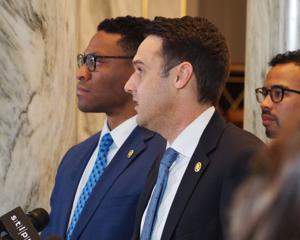New Missouri public safety law protects law enforcement, reforms criminal justice system

(The Center Square) – Gov. Mike Parson signed several public safety bills into law in July, but Senate Bill 53 contained the broadest range of both protections for law enforcement and reforms to the criminal justice system.
The 176-page omnibus bill passed by a 31-2 margin in the Senate, 140-4 in the House, and was signed by a governor who was once the Polk County sheriff. While Republicans hailed new provisions to help law enforcement, state Sen. Brian Williams, D-St. Louis, called it, “one of the strongest criminal justice reform packages of the history of the state.”
Eliminating the residency requirement for the Kansas City Police Department was the initial focus of the legislation, sponsored by Sen. Tony Luetkemeyer, R-Parkville, the majority caucus whip. But for every point in the bill to assist law enforcement, there seems to be a criminal justice reform counterpoint.
The bill’s banning of choke-holds by law enforcement officers was a bipartisan rallying point. The law states a law enforcement officer “shall not knowingly use a respiratory choke-hold unless such use is in defense of the officer or another from serious physical injury or death.” It defines choke-holds as “use of any body part or object to attempt to control or disable by applying pressure to a person’s neck with the purpose of controlling or restricting such person’s breathing.”
“I always make it very clear that George Floyd could have easily been me and that was my primary focus on why I decided to pursue police reform,” said Williams, referring to the murder of Floyd by Minneapolis police officer Derek Chauvin last year, during an interview on “This Week in Missouri Politics.” “It was probably one of the most difficult pieces of legislation to get through a [Republican] supermajority legislature. We’re proud of the legislation and we’re glad we got it done. We had a team of folks that they were very helpful in the process.”
In addition to the bipartisan work in the Senate, Williams gave credit to Reps. Rasheen Aldridge, D-St. Louis, and Shamed Dogan, R-Ballwin. However, Williams said discussing the legislation with both activists and law enforcement leaders throughout the state was critical.
“We went off throughout the entire state – Springfield, Jefferson City, various parts of St. Louis and Columbia,” Williams said. “We wanted to know what they were thinking about on how to move forward. By creating that stakeholder group, we were able to come up with some very strong policies.”
The law now makes it a felony for anyone to post on the Internet any “personally identifiable information” of a law enforcement officer, corrections officer, parole officer or prosecuting attorney, or the information of an immediate family member of those officers. The bill creates the “Critical Incident Stress Management Program” within the Department of Public Safety to provide services for peace officers to assist in coping with stress and potential psychological trauma resulting from a response to a critical incident or emotionally difficult event.
Luetkemeyer praised Williams and others for collaborating on the bill.
“It’s been the highlight of my Senate term to partner with my good friend Brian Williams,” Luetkemeyer posted on social media. “We wouldn’t be here without the work of Rep. Lane Roberts, R-Joplin, and the support of so many law enforcement groups, including the Missouri Fraternal Order of Police, the Kansas City Fraternal Order of Police, the Missouri Police Chiefs Association, the Missouri State Troopers’ Association, and the Missouri Sheriffs Association.”
The law creates a police use-of-force database, requires law enforcement to be fingerprinted when licensed and every six years thereafter. It also requires law enforcement to submit to a criminal history background check and to a system updating any criminal history information reported to the FBI.
“I remember being that 18-year-old kid in Ferguson, driving-while-black and having my constitutional rights violated while handcuffed, on the sidewalk,” Williams said. “There is a subculture of bad police officers out there. I experienced that firsthand. That’s what contributes to activism. That’s what contributes to advocacy. But, also, thoughtful police officers understand they need to do better in their profession.”
Williams praised the addition of expunging arrest records to the law, including those convicted for unlawful use of a weapon and federal misdemeanor domestic assault. The petition for expungement for a felony was shortened from seven years to three and for a misdemeanor anytime after sentencing.
“Now folks who may have made a mistake in their life can have their records expunged,” Williams said. “Those are things that are going to help folks get quality jobs, but getting their records expunged means they don’t have a mistake following them for the rest of their lives.”
Other provisions in the law include:
Any sheriff or jailer who holds a person in custody shall ensure that an appropriate quantity of feminine hygiene products are available at no cost to female offenders while confined in any correctional center or jail.Anyone using a laser pointer and knowingly directs its light toward a uniformed safety officer or other first responder shall be guilty of a misdemeanor.A law enforcement officer who engages in sexual conduct with a detainee or prisoner who is in the custody of such officer shall be guilty of a felony.
Disclaimer: This content is distributed by The Center Square


